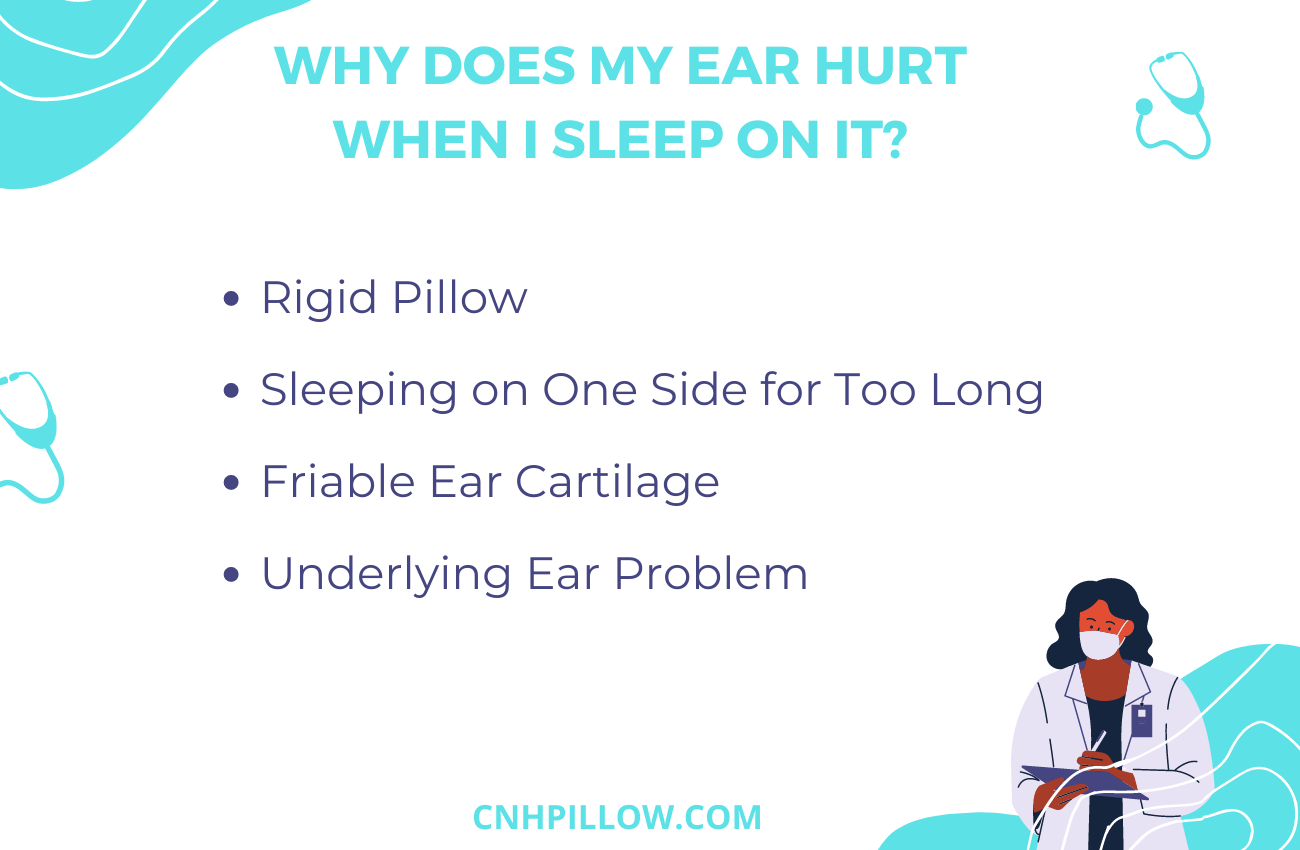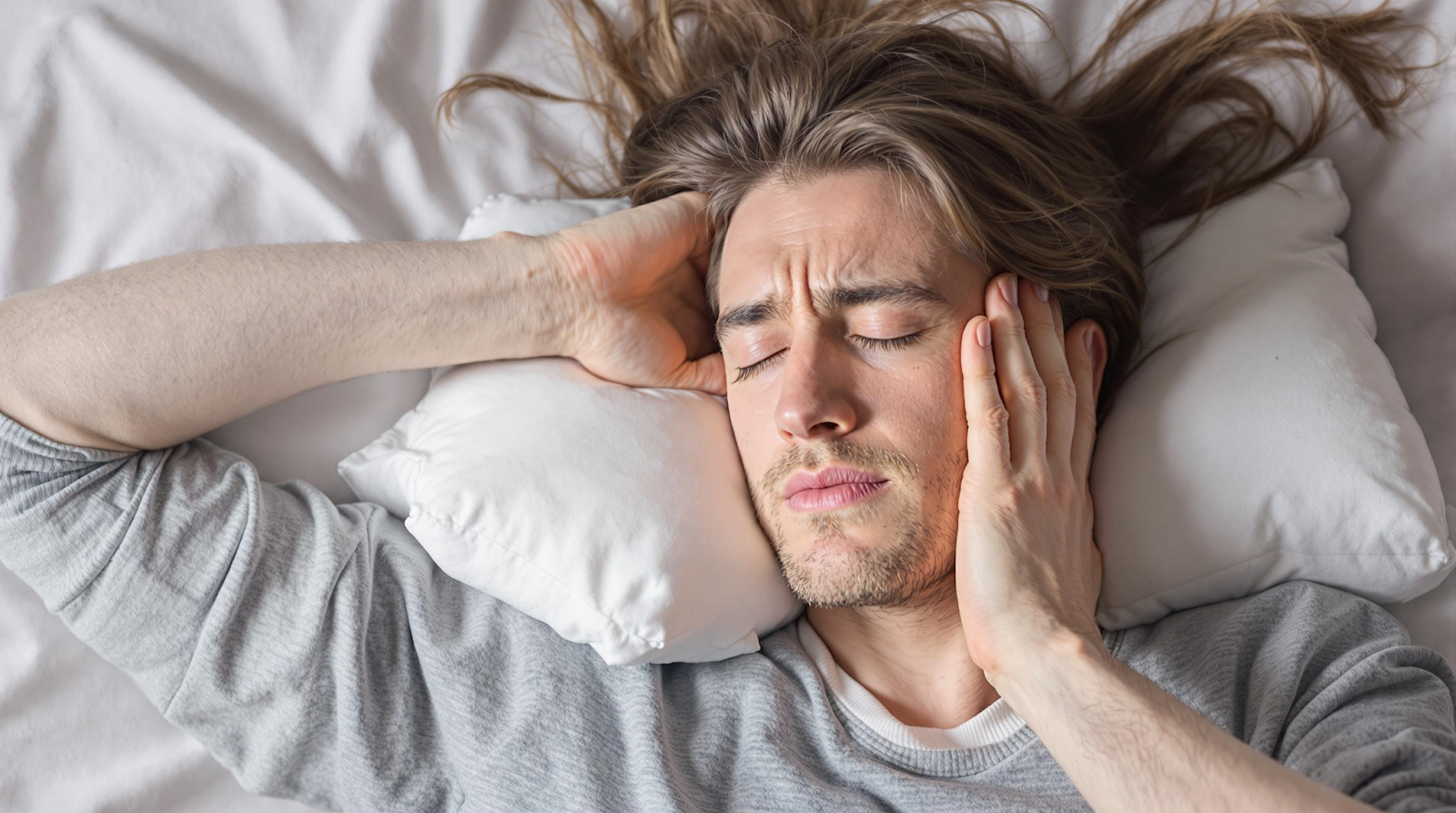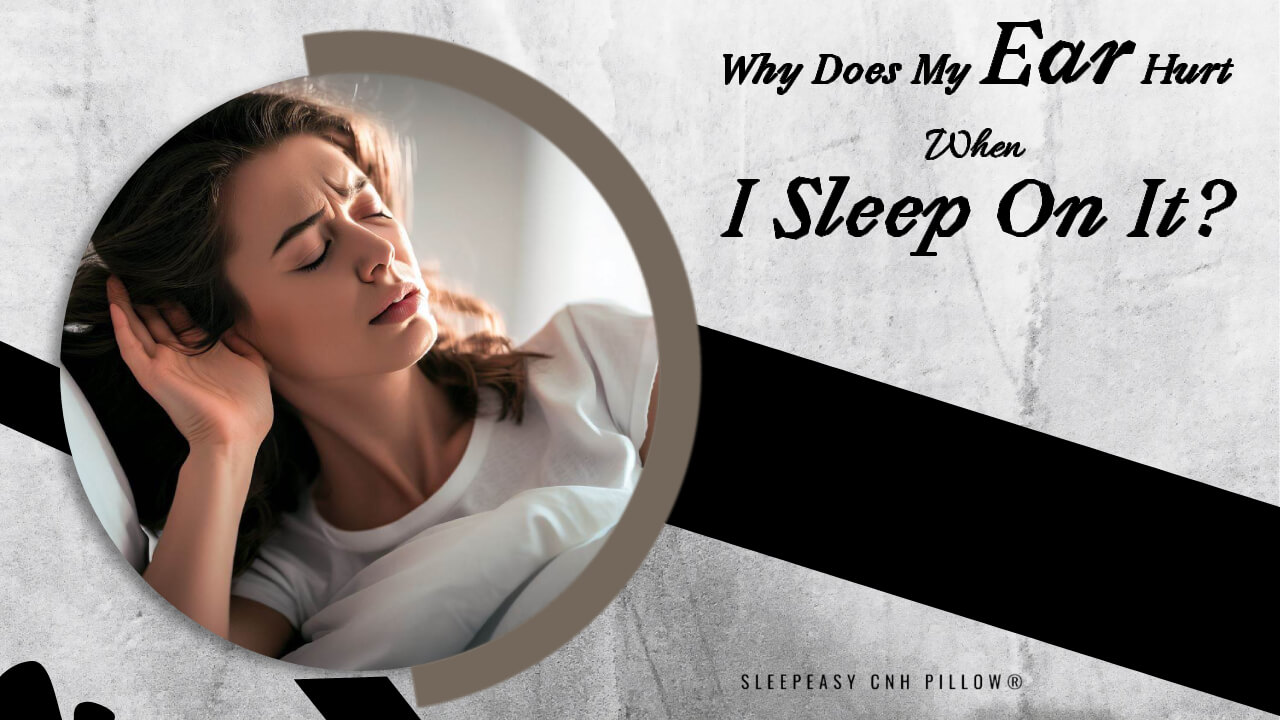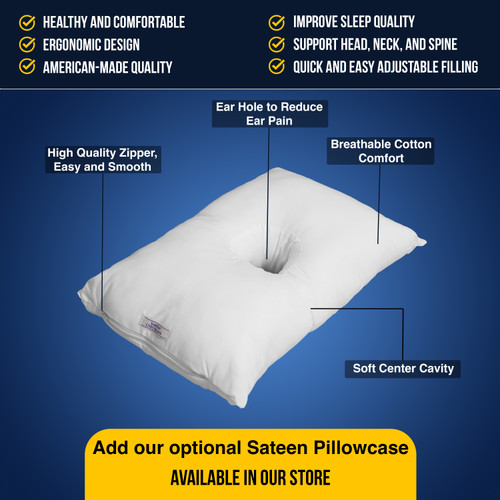My Ear Hurt When I Sleep On It
Posted by Dr. Cannon on Aug 22nd 2022
Dealing with Ear Pain from Sleeping on the side? Know the Causes and Solutions
Waking up with a sore or aching ear after a night’s sleep on your side can be frustrating—and surprisingly common. While ear pain is often linked to infections, injuries, or medical conditions, many people don’t realize that something as simple as your sleeping position could be the real issue.
Ear pain from sleeping on the side may not seem serious at first, but it can affect your sleep quality, lead to tenderness throughout the day, and in some cases, be a sign of an underlying condition that needs attention. The good news? It's usually preventable—and treatable—with just a few small adjustments to your sleep habits and setup.
Key Highlights
- Some common causes of side sleeping ear pain include pressure on the ear cartilage, poor pillow support, and how they affect your sleep.
- There are several practical solutions for ear pain from side sleeping, such as using specialized pillows with ear cut-outs and improving comfort.
- Protect healing piercings, avoid skin irritation, and maintain healthy sleep habits to reduce ear pain.
- The signs that indicate when you should consult a doctor like fever with ear pain or swelling.

Why Does Your Ear Hurt When You Sleep on Your Side?
If you've ever noticed pain in one ear after a good night's sleep, chances are it's due to pressure or irritation rather than a serious medical condition. This discomfort is often caused by direct pressure on the ear cartilage, particularly the outer part of the ear known as the pinna.
Ear pain from sleeping on the side can also result from poor pillow support that leads to awkward head or ear positioning, increased friction or skin irritation from bedding, or even underlying conditions such as Chondrodermatitis Nodularis Helicis (CNH), a pressure-related condition that affects the ear cartilage.
Some Common Causes of Ear Pain from Side Sleeping
Waking up with ear pain after sleeping on your side can be caused by a range of factors, from simple pressure to more complex conditions. Let’s explore the most common reasons and how they affect your ears.
1. Pressure on the Outer Ear
One of the most frequent causes of ear pain during side sleeping is direct pressure on the outer ear. When you lie on your side, your ear is compressed between your head and the pillow. The outer part of the ear—called the pinna—is made of cartilage and soft tissue, which isn’t designed to bear sustained weight or pressure.
Over the course of a night, especially if you stay in one position for a long time, this pressure can reduce circulation to the area and cause discomfort or even minor tissue damage. While the pain might go away during the day, repeated pressure night after night can lead to chronic soreness or tenderness.
Common signs include
- Dull or sharp pain in the outer ear, especially upon waking.
- Redness or mild swelling of the ear after sleep.
- Discomfort that improves when you switch sides or sleep on your back.
- A sensation of warmth or irritation in the affected ear.
2. Chondrodermatitis Nodularis Helicis (CNH)
CNH is a medical condition caused by chronic pressure on the ear, especially in side sleepers. It results in a painful, inflamed nodule on the cartilage—usually on the rim (helix) or just inside it (antihelix). CNH tends to affect older adults or those with thinner cartilage, but it can happen to anyone who consistently sleeps on one side.
What makes CNH particularly problematic is that it doesn’t go away on its own easily. The affected area is often extremely sensitive, and even light touch or cold air can cause discomfort. If left untreated, the condition may worsen or become infected.
Signs and symptoms to look for
- A firm, painful bump on the outer ear.
- Persistent localized pain that worsens at night.
- Sensitivity to pressure, even during the day.
- A small ulcer or sore that may crust over.
3. Poor Pillow or Mattress Support

The type of pillow you use plays a significant role in the amount of pressure placed on your ear and neck, which can contribute to ear pain when sleeping on your side. You must understand how your pillow can affect ear pain and and for that, consider exploring pillow related ear pain causes & solutions, which can help you choose the right pillow for comforting sleep.
A flat pillow may cause your head to tilt downward, while a very firm pillow may offer no cushioning, leading to sharp compression on the ear. Over time, this can not only lead to ear pain but also contribute to neck stiffness, headaches, and poor sleep quality.
Possible indicators include
- Ear pain that resolves when changing to a softer or shaped pillow.
- A pillow that’s lost its form or firmness over time.
- Frequent waking due to discomfort or repositioning.
- Stiffness in the neck or shoulders upon waking.

Pillow with a Hole
Experience unparalleled comfort and relief from ear pain with our innovative pillow designed with a hole in the middle. SleepEasy Pillow with Hole in the Middle was conceived and designed by Dr. Cannon in the late 1980s. His source of inspiration was the plight of CNH patients who were side sleepers and couldn’t sleep well.
Pillow with a Hole- 59.99
Buy NowThe solution is to replace your pillow with a soft pillow maybe a pillow with a hole for a few nights and see if the ear pain disappears. If this works, it's great; if not, consult your doctor to see if you have any ear ailment causing this ear pain.
Try SleepEasy Cotton Comfort Pillow for a few nights to get rid of rigid pillow ear pain.
4. Ear Cartilage Pain from Pressure or Strain
Even without a specific condition like CNH, the cartilage in your ear can become sore from prolonged pressure. Ear cartilage pain when you sleep on a side often becomes a cause of pain in your ear. Since the cartilage is dense and lacks much cushioning, repeated compression—especially during long periods of side sleeping—can lead to sharp or aching pain.
This type of discomfort is especially common in people with thinner ears or less fat padding. It's not always visible, but the pain can linger and worsen if not addressed.
Key signs of cartilage-related pain
- Sharp or aching pain localized in the ear’s upper or outer part.
- Tenderness that worsens with pressure or touch.
- Lingering discomfort even after adjusting your sleep position.
- No obvious swelling or redness, but persistent soreness.
5. Ear Piercings
Cartilage piercings—especially helix, conch, or tragus piercings—can be very sensitive during the healing process. Sleeping on the pierced ear can slow down healing, cause pressure buildup, or even lead to infection. Even fully healed piercings can become irritated if pressure is consistently applied.
In many cases, side sleepers with fresh piercings experience swelling, throbbing, or pain that gets worse overnight. Continued pressure on healing tissue can result in complications such as hypertrophic scarring or keloids.
Sleep comfortably with our Ear Piercing Pillow
Buy NowWhat you might experience
- Swelling or throbbing pain after sleeping on the piercing.
- Prolonged healing time or recurring inflammation.
- Fluid discharge or crust formation around the piercing.
- Small bumps or scar tissue forming near the site.
6. Skin Conditions or Irritation
The skin on and around the ears is sensitive and can easily become irritated by friction, allergens, or dryness. If you suffer from conditions like eczema, psoriasis, or seborrheic dermatitis, the added pressure from sleeping on one side can trigger flare-ups.
Rough pillowcases, buildup of detergent residue, or synthetic fabrics can also contribute to irritation. In addition, moisture from sweating at night or blocked pores can further worsen the condition, leading to itchiness, flaking, and sensitivity.
Signs to pay attention to
- Dry, flaky, or red skin on or around the ear.
- Itching or burning sensations during or after sleep.
- Sensitivity to certain fabrics or pillowcase materials.
- Symptoms that improve with skin treatments or changing pillow covers.
10 Easy Relief Tips for Ear Pain from Side Sleeping

Ear pain from sleeping on the side is frustrating but often preventable with the right adjustments to your sleep environment and habits. Here are 10 effective strategies to help reduce pressure on your ears and improve your sleep comfort:
1. Use a Pillow with an Ear Cut-Out or Hollow Center
Specialized side sleeper pillows with a built-in ear cut-out or hollow center are designed to take pressure off the ear while still supporting the head and neck. These are particularly helpful if you experience regular soreness or if you have ear piercings or cartilage sensitivity.
Benefits
- Eliminates direct contact between your ear and the pillow.
- Reduces pressure on cartilage and helps prevent inflammation.
- Ideal for CNH or healing piercings.
2. Switch Up Your Sleeping Position
Changing your sleep position is one of the easiest ways to reduce ear pain when sleeping on the side. While side sleeping is common, consistently sleeping on the same side can lead to repeated pressure and discomfort.
Try this
- Sleep on your back to eliminate all ear pressure.
- If you’re a side sleeper, alternate sides each night.
- Use a body pillow to support side sleeping without crushing your ear.
3. Choose a Soft, Supportive Pillow
A high-quality pillow that balances softness with support can make a big difference. Memory foam or gel pillows that mold to your head’s shape can provide even support without putting pressure on your ear.
Look for
- Medium firmness (not too hard or too flat).
- Contoured or orthopedic designs that cradle the head and neck.
- Breathable materials that keep you cool while you sleep.
4. Use a Donut Cushion or Small Foam Pad
If you’re not ready to switch pillows, placing a small donut cushion or foam pad under your ear can help. These create a “pressure-free zone” by allowing your ear to rest in open space.
Helpful tips
- Position the cushion so your ear sits inside the center.
- Choose a soft, hypoallergenic material for comfort.
- Great for travel or temporary use during flare-ups
5. Adopt Healthy Sleep Habits
Incorporating healthy sleep habits can significantly reduce ear pain caused by skin irritation or discomfort. Especially seniors must ensure that they adopt healthy sleep habits. They should consider tips for healthy sleeping habits and free themselves from factors that contribute to skin issues around their ears. For instance, friction from rough fabrics or detergent buildup on pillowcases can aggravate skin sensitivity, especially if you have conditions like dry skin or eczema.
By focusing on better sleep practices, you can minimize irritation and improve your overall comfort.
Prevention tips
- Maintain a clean and comfortable sleep environment with fresh, soft bedding.
- Use hypoallergenic or silk pillowcases to reduce friction on your skin.
- Keep your ears moisturized with fragrance-free lotions to prevent dryness and irritation.
6. Avoid Earbuds, Headphones, or Pressure Devices While Sleeping
Wearing earbuds, headphones, or sleep aids that press against your ear can cause irritation or pain, especially if worn for long periods. Even low-profile sleep headphones can apply unwanted pressure.
Better alternatives
- Use a white noise machine or speaker instead of earbuds.
- If needed, opt for flat, ultra-thin sleep headphones.
- Make sure nothing is trapped between your ear and the pillow.
7. Protect Healing Piercings
Cartilage piercings can take months to fully heal, and any pressure can delay the process or cause complications. Protecting your ear during sleep is critical, especially during the first 6–12 weeks post-piercing.
Tips for piercing care
- Sleep on the opposite side until healing is complete.
- Use a travel pillow or an ear hole pillow to avoid contact.
- Clean the piercing before and after sleep to prevent infection.
8. Maintain Good Ear Hygiene
Earwax buildup or irritation inside the ear canal can also contribute to discomfort when pressure is applied externally. While outer ear pressure is the main cause, inner ear sensitivity can make pain worse.
Keep ears healthy by
- Gently cleaning your ears with a damp cloth.
- Avoiding cotton swabs, which can push wax deeper.
- Using ear drops or seeing a doctor if you suspect wax blockage.
9. Upgrade to a Supportive Mattress
Your mattress plays a big role in how your pillow supports you. A too-soft or sagging mattress can throw off your head and neck alignment, leading to poor weight distribution and more ear pressure.
What to consider
- Choose a medium-firm mattress for better spinal alignment.
- Avoid mattresses that dip or sink at the shoulders and head.
- Use a mattress topper if your current mattress is too firm.
10. Try Ear Guards or Soft Ear Covers
Soft silicone or foam ear guards can protect your ears from friction and pressure while you sleep. These are especially useful for people recovering from surgery, injuries, or sensitive skin flare-ups.
Benefits of using ear covers
- Cushions the ear without trapping heat.
- Prevents rubbing from rough pillowcases.
- Helps reduce contact for healing conditions or piercings.
When to See a Doctor?

- Pain Lasts More Than a Few Days: If ear pain persists beyond a few days despite adjustments, it may require medical attention.
- Notice Swelling Around the Ear: Swelling may indicate infection, inflammation, or fluid buildup that needs treatment.
- Discharge or Fluid Leaking from the Ear: Discharge, especially if yellow or bloody, can be a sign of an infection or injury.
- Hearing Issues Develop: Difficulty hearing or a feeling of fullness in the ear could suggest an ear infection or fluid buildup.
- Persistent Lump or Nodule: A hard, painful lump that doesn’t go away could be a sign of CNH or another issue.
- Severe, Sharp, or Throbbing Pain: Intense pain may point to an infection, trauma, or serious ear condition that needs attention.
- Fever with Ear Pain: A fever along with ear pain is often a sign of an ear infection that requires treatment.
- Recent Ear Injury or Trauma: Any injury to the ear could lead to damage that needs prompt medical care.
Conclusion
Ear pain when sleeping on the side is a common issue, but with simple adjustments, it can be alleviated and even prevented. By understanding the underlying causes, such as pressure, poor pillow support, or ear conditions, you can make changes that will help you wake up pain-free. Prioritize comfort, choose the right pillows, and maintain proper ear hygiene for a better sleep experience. To further enhance sleep comfort, especially for seniors, check out the role of pillows in managing insomnia for seniors for helpful insights and tips.
Try out our pillow with a hole for ultimate comfort sleep!
Shop NowFrequently Asked Questions
Can ear pain from side sleeping be prevented?
Yes, using a specialized pillow, alternating sleep positions, or adding a donut cushion can reduce pressure and alleviate discomfort.
How can I treat ear pain caused by sleeping on my side?
Simple remedies include adjusting your pillow, switching sleep positions, using a cushion to relieve pressure, and managing skin conditions around the ear.
Is it safe to sleep on my ear if I have a cartilage piercing?
No, sleeping on a fresh piercing can hinder healing and cause irritation. It’s best to avoid pressure on the piercing until it fully heals.
What kind of pillows can I use to prevent ear pain while sleeping on my side?
Try memory foam or ear-shaped pillows to reduce pressure on your ear. Adjustable water or latex pillows also offer customized support for better comfort.




